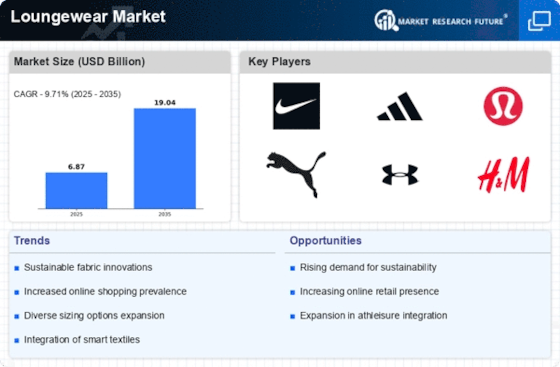Top Industry Leaders in the Loungewear Market

The loungewear market has become a focal point in the apparel industry, reflecting a shift in consumer preferences towards comfort and versatility. As of 2023, key players in this market have strategically positioned themselves to meet the growing demand for stylish yet comfortable clothing suitable for both indoor and outdoor wear. The competitive landscape is shaped by various factors, including brand positioning, product innovation, and responsiveness to evolving consumer trends.
Key Players:
L Brands Inc. (U.S.)
H & M (Sweden)
Triumph International Holding GmBH (Germany)
Authentic Brands Group LLC (U.S.)
Urban Outfitters (US)
Nordstrom Inc. (U.S.)
Hanesbrands Inc. (US)
Jockey International Inc. (U.S.)
Marks & Spencer Group Plc (U.K.)
PVH CORPORATION (U.S.)
Strategies Adopted:
The loungewear market employ various strategies to maintain and enhance their market positions. Product diversification is a common approach, with an emphasis on creating loungewear that caters to different occasions and style preferences. Brands often collaborate with influencers and celebrities to enhance their market reach and appeal to specific consumer segments. Digital marketing and e-commerce play a significant role, with companies investing in online platforms to streamline the purchasing process and capitalize on the growing trend of online shopping. Sustainability initiatives, including the use of eco-friendly materials, are increasingly becoming a strategic focus, aligning with consumer demand for more responsible and environmentally conscious fashion.
Market Share Analysis:
The loungewear industry involves evaluating multiple factors. Brand recognition and loyalty are key contributors, influencing consumers' choices in a market where brand perception is closely tied to fashion preferences. The ability to offer a diverse range of loungewear options, including different styles, colors, and sizes, is crucial for appealing to a wide consumer base. Pricing strategies, supply chain efficiency, and the effectiveness of marketing campaigns are additional factors that impact market share. The integration of sustainable practices and the adoption of inclusive sizing can also play a pivotal role in gaining consumer trust and expanding market share.
News & Emerging Companies:
The loungewear market has witnessed the emergence of new companies focusing on innovative designs, sustainable practices, and niche segments. Emerging companies often leverage digital marketing and e-commerce to establish their presence in a competitive market. News in this industry typically revolves around product launches, collaborations with influencers, and efforts to incorporate sustainable materials into production processes. The emergence of smaller, direct-to-consumer brands with a focus on sustainable and ethical practices is indicative of the evolving consumer preferences in the loungewear market.
Industry Trends:
The loungewear market often highlights trends in materials, design, and sustainability. Companies are increasingly investing in eco-friendly practices, incorporating recycled materials, and adopting circular economy principles. The integration of technology, such as smart fabrics or sustainable manufacturing processes, is gaining traction as brands seek to differentiate themselves in a competitive market. Current investment trends reveal a continued focus on e-commerce infrastructure, with companies optimizing their online presence and exploring innovative ways to enhance the digital shopping experience.
Competitive Scenario:
The loungewear market is characterized by a diverse range of players catering to various consumer preferences. Established brands, particularly those with a strong background in activewear, leverage their reputation and technology-driven designs to offer loungewear with performance features. Fast fashion brands focus on staying attuned to current trends and quickly adapting their loungewear collections to match changing consumer preferences. The market also sees the rise of direct-to-consumer brands that prioritize sustainability, inclusivity, and unique designs to attract a specific audience.
Competition is not only centered around product aesthetics and functionality but also extends to factors such as supply chain efficiency, digital marketing strategies, and the ability to respond swiftly to evolving market dynamics. Brands that can strike a balance between offering comfortable and stylish loungewear while aligning with consumer values are better positioned to thrive in this competitive landscape.
Recent Development
Nike, Inc. made headlines by incorporating smart technology into its loungewear collection. The introduction of temperature-regulating fabrics and moisture-wicking properties enhanced the functionality of the loungewear, catering to consumers seeking performance features in their casual clothing. This development reflects Nike's strategy of integrating innovation and technology-driven designs to meet the evolving needs of modern consumers.
Adidas AG focused on inclusivity in its loungewear line, introducing extended sizing options to cater to a broader range of body types. This strategic move acknowledged the growing demand for size-inclusive fashion and positioned Adidas as a brand committed to diversity and accessibility. Boohoo Group plc adapted to the rapidly changing fashion cycles by introducing a limited-edition loungewear collection inspired by current trends, showcasing the brand's agility in responding to fast-moving consumer preferences.











